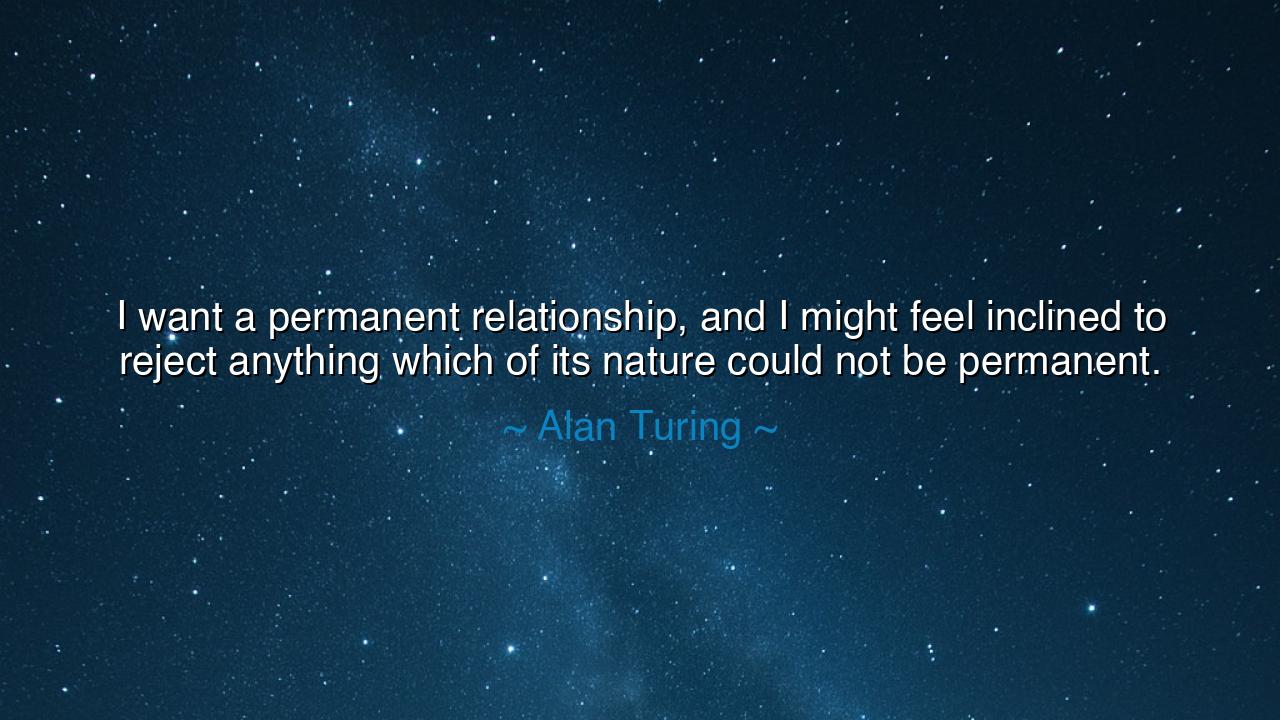
I want a permanent relationship, and I might feel inclined to
I want a permanent relationship, and I might feel inclined to reject anything which of its nature could not be permanent.






Hearken to the words of Alan Turing, who once declared: “I want a permanent relationship, and I might feel inclined to reject anything which of its nature could not be permanent.” In this utterance we glimpse the yearning of a soul that sought not passing shadows, but bonds rooted in eternity. The mortal heart longs for permanence, for what endures when all else fades like mist before the rising sun. Turing, who pierced the mysteries of mind and machine, knew too well that what is fleeting is fragile, and what is fragile cannot be the foundation of a life’s great work.
The desire for a permanent relationship is no mere craving for companionship, but a quest for constancy in a world forever in motion. It is the cry of one who refuses to be satisfied with illusions, who sees beyond the temporary pleasures of the moment to the deeper harmony that abides across time. Such a yearning is ancient as humanity itself, echoing through the oaths of lovers, the covenants of nations, and the vows sworn by kindred spirits.
When Turing speaks of the inclination to reject what cannot endure, he speaks with the stern wisdom of one who values truth above comfort. For what profit is there in building upon foundations of sand? To embrace the transient as though it were eternal is to court sorrow. Thus he counsels future generations: discern what is lasting, cast aside what is passing, and let your heart not be deceived by glittering vanities.
This wisdom rises from the very depths of human struggle. Turing, whose life bore the weight of secrecy, solitude, and misunderstanding, still longed for a bond that would defy such storms. His words reveal a hero’s desire for constancy, for an anchor unshaken by the tempests of fate. In this, his voice joins the great chorus of those who sought not just survival, but meaning—a fellowship eternal, unbroken by time or circumstance.
Thus let the teaching be remembered: seek the permanent, honor the enduring, and turn away from that which cannot stand the trial of years. For only in that which lasts shall the spirit find rest, and only in constancy shall love and loyalty achieve their fullest power. Would you like me to deepen this further into a more mythic parable—almost like a fable, where Turing’s words become a guiding law passed down by sages?






TAThu Tran Anh
Turing’s words seem to convey a longing for stability, but they also raise an interesting dilemma. Is it possible to enjoy and value relationships that we know are temporary? If we reject everything that’s not permanent, do we risk missing out on valuable experiences? I wonder if the pursuit of permanence in relationships sometimes clouds our ability to appreciate the present. Is it better to cherish what we have, even if we know it’s fleeting?
TPtruong pham
Alan Turing’s quote makes me reflect on the nature of relationships in general. It’s almost as if he’s setting an ideal standard, one where only the things that can endure the test of time are worthy of his attention. But isn’t part of the beauty of life the impermanence of things? Can we really reject everything that isn’t permanent? How does this mindset affect how we engage with people, places, or ideas that might not last forever?
LHLuong Hien
Turing's perspective on relationships raises a fundamental question: can we ever expect anything to last forever? It feels like he's striving for security, but the world around us is constantly shifting. What happens when we become too rigid in our expectations of permanence? Could the fear of non-permanent relationships limit our experiences? Does this drive for permanence prevent us from embracing the beauty of the transient moments in life?
HLLan Huong Lan
Turing's desire for permanence in relationships seems deeply rooted in his quest for stability. But can we ever truly have permanent relationships? In a world that is constantly evolving, can we reject things that don't meet this permanent standard? It makes me question whether the need for permanence in relationships is realistic, or whether accepting impermanence is a more natural approach to human connection. How do we find balance between stability and change?